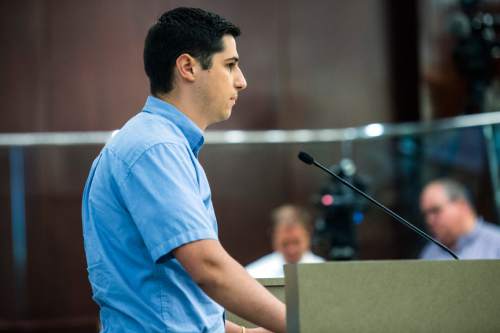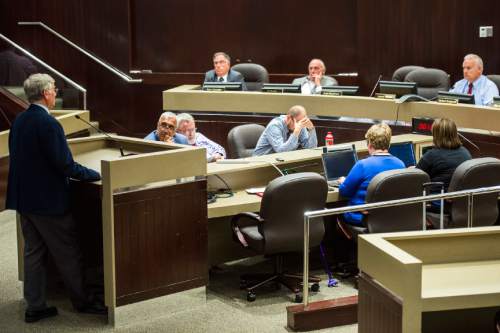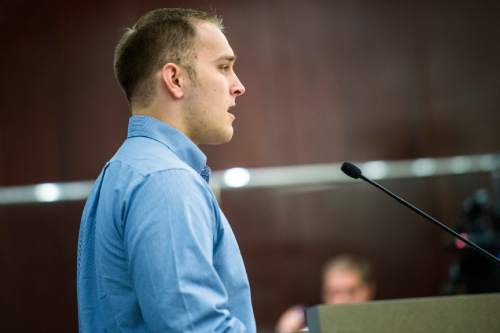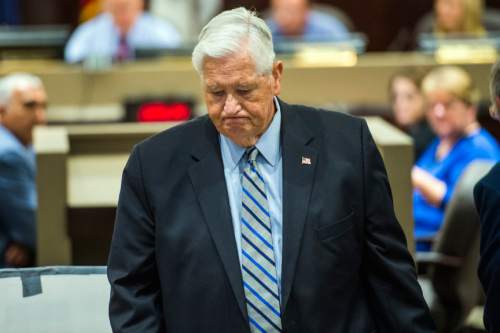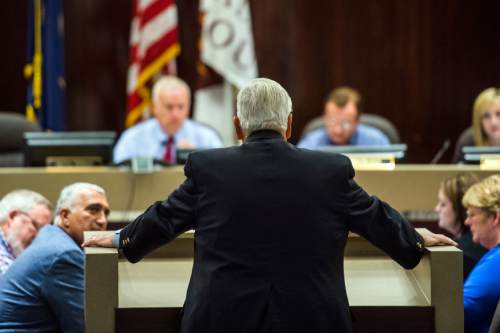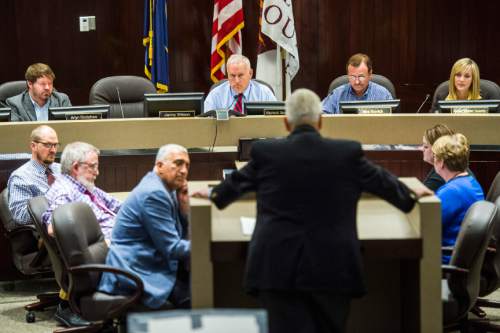This is an archived article that was published on sltrib.com in 2015, and information in the article may be outdated. It is provided only for personal research purposes and may not be reprinted.
After passionate debate, intense lobbying and with one vote to spare, the Salt Lake County Council voted Tuesday to place a sales-tax hike for transportation on the Nov. 3 ballot.
The vote was 7-2. But a two-thirds majority (6-3) was required by an ordinance passed last year to normally restrict tax-hike initiatives to general elections in even-numbered years, when voter turnout is much higher than in municipal elections.
Voters now will decide this year whether to raise sales taxes by a penny for every $4 in sales. Forty percent of the money would go to the Utah Transit Authority for bus and rail service, and the rest would go to cities and the county for local roads.
Other counties are now expected to follow Salt Lake County's lead. They had delayed action to see if the state's largest county would approve the election, figuring that most voter education and news media attention on the issue would be focused in Salt Lake County. Proceeding in unison, they reasoned, would be easier and cheaper.
The Legislature this year authorized counties to choose whether to put this issue on the ballot.
Legislative analysts figure it would raise about $146 million a year for local transportation if passed by all counties — costing about $50 per resident.
Two Republicans, Council Chairman Richard Snelgrove and Steve DeBry, opposed holding the election this year — especially after the council just last year passed its ordinance saying such elections should be held in higher-turnout general elections to ensure as much participation as possible.
"If those same arguments were valid then, then they are valid today," Snelgrove said.
But Arlyn Bradshaw, a Democrat, said that ordinance allowed exceptions, as long as a two-thirds vote is achieved, for urgent needs. He said transportation qualifies.
"Those funds are urgently needed," he said, noting all 16 cities in Salt Lake County had passed resolutions urging the election this year, saying state funding is not covering their road needs and that delaying the election would only compound problems.
Three mayors — from Draper, Riverton and Cottonwood Heights — appeared in person to make the same arguments. "Every year that we don't properly care for the maintenance of our roads, the more it will cost citizens," said Riverton Mayor Bill Applegarth.
Council member Max Burdick, a Republican, said he feels it is important that all voters have a chance to decide the matter, not just the nine-member council. "It should be on the ballot so the decision can be made by the many and not just the few," he said.
DeBry responded, "That's my point exactly. If we want the decision by the many, it should be on the 2016 election cycle" when more people would vote in the presidential election.
DeBry said a one-year delay might increase chances of passage, and perhaps lead the Legislature to allow separate tax elections for local roads and the UTA — because of controversy over UTA executive salaries, bonuses and travel.
"Due to what's going on with UTA currently, that could be the demise if it goes on the ballot this year," DeBry said.
Several other council members also called on UTA to promise and show the public that its 40 percent share of the tax hike will go to expand bus services, and not for rail projects or executive perks.
"This message is coming through very loud and clear," UTA Board Chairman H. David Burton told the council. "We will enhance transit service."
Burton said that will include doubling weekend service, and having most bus routes operate more frequently and later at night.
Resident Justin Anderson wasn't swayed, and still asked the council to oppose the election largely because of UTA. "Today's comments are pleasant, but their history has not been," he said, complaining about agency salaries and bonuses.
He was one of a long parade of residents speaking against the tax increase, with most saying they oppose it largely because of UTA. Meanwhile, business leaders and mayors testified for it.
Amid heavy campaigning against the measure by the conservative Americans for Prosperity, DeBry said he had received 400 emails and 200 phone calls on the matter, mostly from opponents. He said it was the most intense interest he had seen by residents on any matter while he has been in office.
Similarly, Snelgrove said, "I've come under intense pressure" — including being told that his opposition might cost him endorsements by mayors and key fundraising. "My decision doesn't come down to that. My vote's not for sale. It is to reflect the will of the people."


